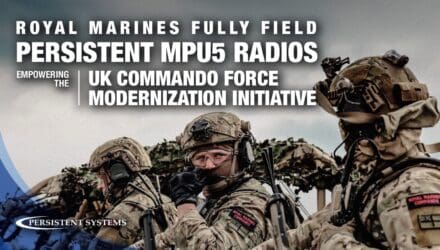This strategic acquisition enhances Forterra’s communications systems with proven mesh networking capabilities, deepening its commitment to the edge user.
Clarksburg, Md., Oct. 9, 2025 — Forterra, a leader in autonomous mission systems, today announced its acquisition of goTenna, the pioneer in tactical mesh networking solutions. This acquisition will accelerate the deployment of decentralized situational awareness at the tactical edge. goTenna enables Forterra’s mission to deliver fully integrated autonomous mission systems to provide secure, resilient communications for disconnected, denied and contested environments.
Traditional, mesh communication networks require expensive, high bandwidth radios. However, for the future of autonomous technology, there is a massive demand for low cost, low bandwidth and hard to detect communications systems. goTenna is the leader in this space and already deployed at scale.
goTenna was founded in 2012 in response to the widespread cellular and internet communication failures that occurred during Hurricane Sandy. It is the only mobile mesh networking company in the world that provides inexpensive, lightweight off-grid connectivity that moves the most mission-critical data even in the most challenging environments where communication is limited or even denied.
“Forterra is committed to delivering mission end-states and enabling our warfighters and men and women in uniform to accomplish their mission more safely and effectively with technology, and that includes distributed, resilient communication systems,” said Josh Araujo, CEO of Forterra. “By integrating goTenna technology into our platform we’re improving user experience in controlling and interacting with robots in operational environments and eliminating communication concerns, especially in denied environments where traditional systems fall short.”
“This acquisition brings together two mission-driven companies, enabling Forterra’s industry-leading ground autonomy platforms to integrate and deploy goTenna’s best-in-class communications stack,” said Ari Schuler, goTenna’s CEO. “goTenna and Forterra are relentlessly driven by a joint desire to deliver advanced capabilities that allow operators to conduct their missions safely and more effectively.”
Schuler will assume the title of President of goTenna. No other personnel or title changes will be a part of the transaction.
Forterra’s expansion from self-driving systems to fully autonomous, end to end, mission systems reflect a strategic shift toward building the entire operating ecosystem for autonomy. Beyond autonomous vehicle platforms, Forterra now delivers the networks and coordination tools that enable autonomous systems to operate as part of a connected, mission-ready force in contested or disconnected environments.
Barclays acted as exclusive financial advisor to goTenna in connection with the transaction.
To meet Forterra CEO Josh Araujo and goTenna President Ari Schuler, and to learn more about the importance of a fortified mesh communications network, stop by the Forterra booth at AUSA, Oct. 13–15.
To learn more, go to?forterra.com.



















































































































